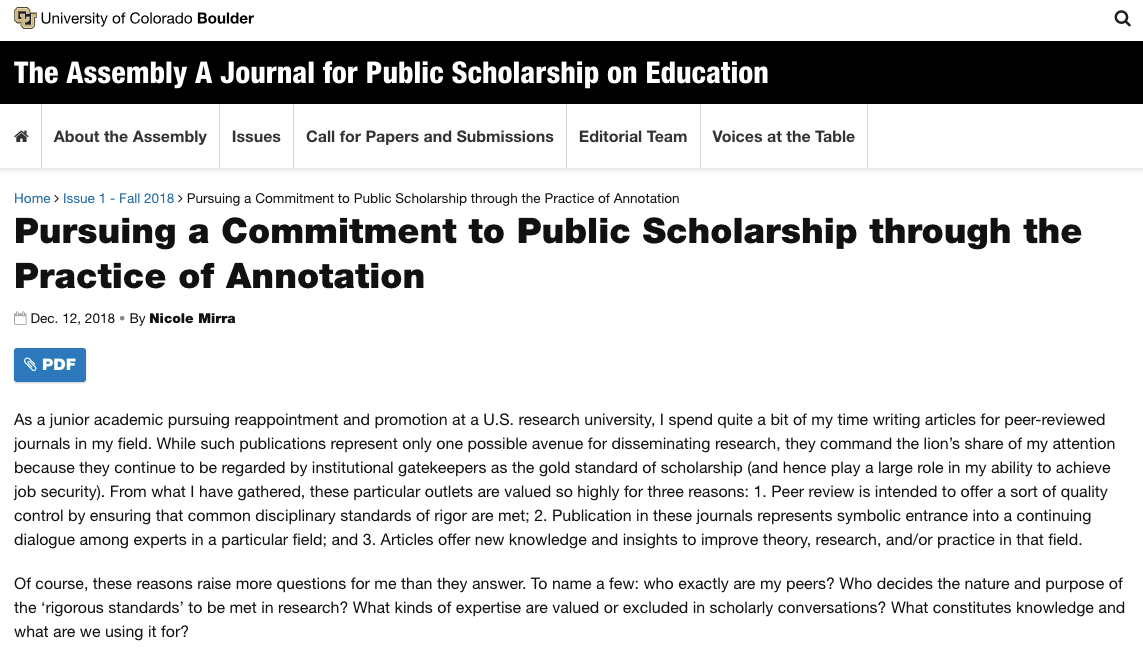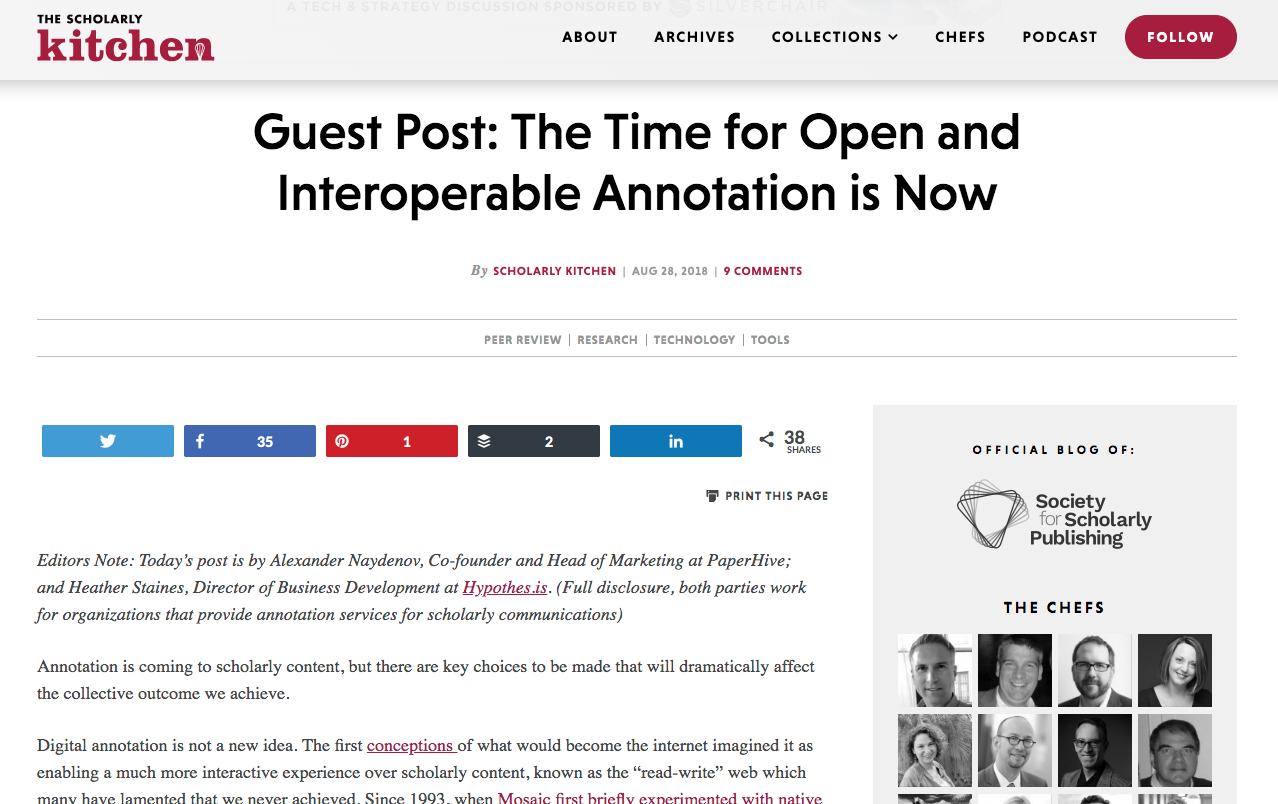Press
Hypothesis in the news.
Read what others are saying about our powerful social annotation solutions. For press inquiries, please contact us.
Simon Fraser University Library
17 December, 2018
This year’s President’s Dream Colloquium on Making Public Knowledge at SFU was all about the public aspects of knowledge production and dissemination at universities. Fittingly, I found myself reading and creating public annotations on the readings for the course using a tool called Hypothesis. I would like to introduce the two big questions that I chose to investigate: What do annotations say about their creators? While the benefits of social reading for the student was fairly obvious to me, I wanted to explore what kind of story the data would tell about the student. In an age of quantification and measurement, what does it mean to create public knowledge in the forms of online annotations? Can we use this data to evaluate students and their performance? Should we? What do annotations say about the original content? Academia is a world of competition. Publish or perish wonderfully summarises the environment that scientists and scholars are facing, as available job positions are scarce while their applications are assessed based on criteria such as publication volume or terrible indicators such as the h-index1 or Journal Impact Factor2 (JIF). Can we use annotation data to assess the articles? Does annotation behaviour reflect the engagement with the articles?
The Assembly A Journal for Public Scholarship on Education
12 December, 2018
My experience with an openly networked public annotation initiative called Marginal Syllabus represented an opportunity to merge these approaches and offered innovative answers to my questions about constructing new peer communities and avenues for public dissemination of research. Through this initiative, in which one of my peer-reviewed journal articles was made available as a public text that could be commented upon, I was given the opportunity to imagine a different paradigm for conducting, consuming, and responding to research - one in which study findings become the start rather than the end of dialogue and in which diverse forms of expertise extend, refute, and re-mix the knowledge production process for the common purpose of making education more equitable and culturally sustaining. I share my experience with the hope of provoking further conversation about what it means to take democratic values seriously in academic research.
Library Journal
12 December, 2018
Academic publishers are looking for ways to engage readers more deeply in their content. By creating opportunities for students, researchers, and otherscholars to share information and interact with each other across disciplines, publishers of academic works will not only engage audiences more deeply; they can foster the kinds of interdisciplinary collaboration that can help tackle society’s biggest challenges. A recent webcast sponsored by Emerald Publishing discussed some of the tools available for supporting deeper engagement with content across disciplines, including Hypothesis.
University of Windsor Office of Open Learning
11 December, 2018
Ever wanted to have a really great, stimulating intellectual conversation with students or colleagues? Do you think it’s just crazy talk to dream that you could actually have a meaningful conversation online, with people who have never met face to face before? Read on.
Europe PMC Blog
4 December, 2018
Scientific communication does not stop at the moment of publication. Scientific discussions in the form of post-publication peer review can provide valuable insights for published articles, bring up an alternative research perspective, or even present updates for published research. At Europe PMC it’s part of our mission to support innovation in scientific publishing, and we believe that community feedback constitutes an important part of scholarly communication process. That’s why we are proud to partner with Hypothes.is, a non-profit organisation developing open annotation tools, to display post-publication comments from PubMed Commons on articles in Europe PMC.
Ubiquity Press ]u[
15 October, 2018
We are happy to announce that we have released a technical change that allows readers to annotate e-books within the browser. Books at Ubiquity Press, and on the wider Ubiquity Partner Network, are often available in EPUB format. We use a great open source package created and maintained by Fred Chasen from FuturePress.org which allows site visitors to read the books in any browser. This means that there are no files to download and no additional software/hardware required to read the EPUB content. We are pleased to say that we have released the latest version of EPUB.js on our platform, which now supports the highly-regarded annotation overlay Hypothesis. The software is built as an open source, community-driven, non-profit service. Hypothesis is a free service to users and allows annotations, highlights, and page notes to be made publicly, privately to oneself, or to a private group (ideal for a class discussion).
FROG Learning Blog
2 October, 2018
A description of a sophisticated learning exercise at the University of Minnesota enabled by custom software applications that enable students to work together to bring multiple artifacts, including Hypothesis annotations, together into a collaboratively authored document.
The Scholarly Kitchen
28 August, 2018
Annotation is coming to scholarly content, but there are key choices to be made that will dramatically affect the collective outcome we achieve. Digital annotation is not a new idea. The first conceptions of what would become the internet imagined it as enabling a much more interactive experience over scholarly content, known as the “read-write” web which many have lamented that we never achieved. Since 1993, when Mosaic first briefly experimented with native annotation, dozens of projects have tried without success. There are many reasons for this failure: a lack of standards, an unwillingness to adopt proprietary systems and centralized implementations, poor user experience, and slow browsers among others.
EDUCAUSE Review
27 August, 2018
Working in open-access institutions with a large majority of underserved populations, community college instructors often face the twofold tasks of helping students become conversant in discipline-specific coursework and also bringing students up-to-speed in their academic skill sets. Between publishers' higher costs of textbooks and students' struggle with large amounts of reading materials, getting students to both access and engage more deeply with texts is a challenge. Using annotation tools that leverage 21st-century technology to bring social reading back to its traditional roots, instructors can help their students develop critical thinking, digital literacy, and collaboration skills.
OPERAS
30 July, 2018
This white paper has been elaborated by the Tools (R&D) Working Group, one of the 7 Working Groups launched by the OPERAS research infrastructure. The Working Group goal was to set up a list of tools and development which need to be done, to improve their usability for the OPERAS partners. The approach in OPERAS emphasizes the importance of building the open science scholarly communication infrastructure in Social Sciences and Humanities on community driven tools. In this perspective, the development of Open Source tools and the setup of a toolbox appear to be appropriate answers to the existing needs and evolutions in scholarly publishing.









